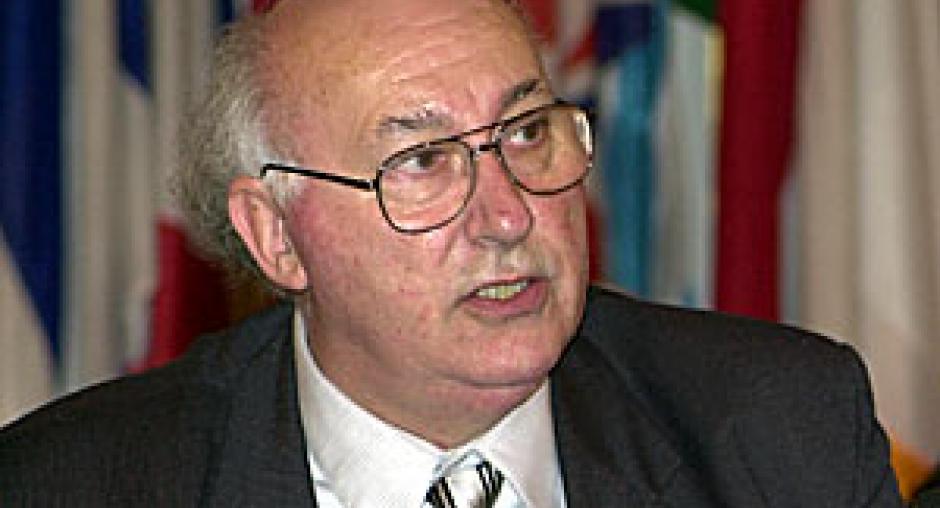Newsroom
OSCE parliamentarians and conflict prevention experts discuss parliamentary oversight of security sector
VIENNA 25 May 2004

Adequate scrutiny over security structures had always been a challenge, said Bruce George, the President of the OSCE Parliamentary Assembly. (Alexander Nitzsche/OSCE) Photo details
VIENNA, 25 May 2004 - Over 150 participants, drawn from the OSCE Parliamentary Assembly, together with experts from the OSCE delegations, are meeting for two days in Vienna to focus on the question: Parliamentary Oversight of Armed Forces, and Police and Security Forces in the OSCE Area.
At the opening session, the President of the Parliamentary Assembly, Bruce George, said that ensuring adequate scrutiny over military, police and security structures had always been a challenge for the committees of legislatures.
"Recent years have seen encouraging developments throughout the world - and events have posed new challenges and opportunities", he added.
Conference participants include not only parliamentarians from the 55 nations of the OSCE area but also representatives from some of the 10 OSCE Asia and Mediterranean Partners for Co-operation as well as representatives from research institutions, namely the Geneva Centre for the Democratic Control of Armed Forces, the Geneva Centre for Security Policy and the Centre for European Security Studies.
Ambassador Lamberto Zannier, Director of the OSCE Conflict Prevention Centre, stressed that the very wide representation at the conference - from all the different regions of the OSCE area, as well as that of OSCE Partners for Co-operation - would support the exchange of experience in the field of parliamentary oversight of the security sector.
Over the course of the two days the participants will discuss the implementation of international commitments for democratic control, especially in countries in transition, as well as international criteria and standards that provide tools for the parliamentarians in implementing this oversight.
On the second day, the participants will have a chance to discuss the challenges posed to parliamentary scrutiny in the current security environment.
Among other important topics, the conference will also address harmonized interaction between the legislative and executive branches in ensuring efficient and well-administered armed forces, as well as the contribution of civil society and the media to the decision-making process.
At the opening session, the President of the Parliamentary Assembly, Bruce George, said that ensuring adequate scrutiny over military, police and security structures had always been a challenge for the committees of legislatures.
"Recent years have seen encouraging developments throughout the world - and events have posed new challenges and opportunities", he added.
Conference participants include not only parliamentarians from the 55 nations of the OSCE area but also representatives from some of the 10 OSCE Asia and Mediterranean Partners for Co-operation as well as representatives from research institutions, namely the Geneva Centre for the Democratic Control of Armed Forces, the Geneva Centre for Security Policy and the Centre for European Security Studies.
Ambassador Lamberto Zannier, Director of the OSCE Conflict Prevention Centre, stressed that the very wide representation at the conference - from all the different regions of the OSCE area, as well as that of OSCE Partners for Co-operation - would support the exchange of experience in the field of parliamentary oversight of the security sector.
Over the course of the two days the participants will discuss the implementation of international commitments for democratic control, especially in countries in transition, as well as international criteria and standards that provide tools for the parliamentarians in implementing this oversight.
On the second day, the participants will have a chance to discuss the challenges posed to parliamentary scrutiny in the current security environment.
Among other important topics, the conference will also address harmonized interaction between the legislative and executive branches in ensuring efficient and well-administered armed forces, as well as the contribution of civil society and the media to the decision-making process.
